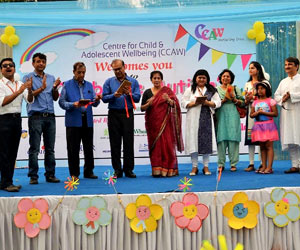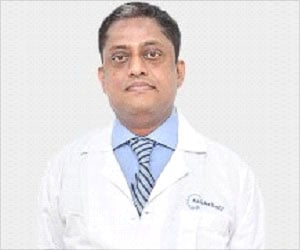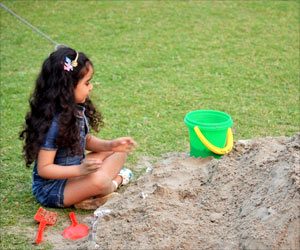Highlights
- World Autism Day is observed on 2nd April every year to raise awareness on autism-related issues.
- Medindia conducted an exclusive interview with Dr.Deepak Gupta, the President of the Centre for Child and Adolescent Wellbeing, who spoke about the autism carnival he organizes each year for autistic children in New Delhi.
- Medindia also spoke to Dr. Abhishek Srivastava, the WHO resource person for Autism Spectrum //Disorder (ASD)
Medindia spoke to the President of the Centre for Child and Adolescent Wellbeing, Dr. Deepak Gupta & Dr. Abhishek Srivastava, the WHO resource person for Autism Spectrum //Disorder (ASD) to get an Indian perspective about this development disorder.
There are approx. 10 million children with Autism Spectrum Disorder (ASD) in India but there are very few centres or resource people to help these children. There is lack of awareness about the condition among parents, teachers and even among the medical professionals. Help is often sought late and late corrective measures do not yield the same results as early interventions.
Children from lower classes with Autism Spectrum Disorder (ASD) fare even worse and are often abused as they never get to see a therapist even after they attain adulthood. The government at present does not allocate enough resources to help this cause.
Autism spectrum disorder (ASD) is the name for a group of neurological developmental disorders that affects social interaction, communication, interests and behaviour.
Children and adults with ASD often have the following common characteristics:
- Behaviour - Repetitive behaviors
- Communications - difficulty communicating and interacting with others
- They may exhibit very focused interests
These symptoms results in difficulty to function socially, at school or work, or other areas of life.
The President of the Centre for Child and Adolescent Wellbeing, Dr. Deepak Gupta who holds a carnival every year to raise awareness about the condition in Delhi for Autistic children answered the following question about the condition and the carnival - for Medindia

What are the challenges faced by autistic children in India?
Ans. The main challenge is lack of awareness, people don’t know where to go, who to speak to and how to go about obtaining treatment. The knowledge available with pediatricians and family members should be improved.
The next challenge is there are not enough places for international strategies to be implemented with a lack of the right resource people to implement them. There are very few centres which are dedicated to helping children with autism. There are 10 million children with autism in India and the available resource people cannot cater to the needs of all of them.
What motivated you to start this carnival?
Ans. This carnival is a great place for families to unwind,most parents claim that their child is very difficult to manage in the house, but the carnival show them in a truly different light. It is held in a farmhouse where the children get to play outside with no restrictions.
This provides them the support to showcase their talent, we have already obtained 40 entries and had to close registrations as it would then become difficult to manage. There has been growing popularity since 2013, when the idea was started.
Have people with autism been able to secure jobs through this carnival? Do you invite prospective employers?
Ans. Their talent lies mainly in the arts and music arena, so last year we invited people from multimedia.
This year too we have invited people from the hospitality industry. ‘Spectrum Stars’ is a unique program, where 5 talents will be projected. One is that of a girl in her mid-twenties who is good at canvassing for products or services. Another is a young man who is a good content writer while another 19 year old boy sketches well and has even drawn a sketch of my face recently.
Do you receive any Government funds for this?
Ans. Currently we are funded by private agencies but we are confident that we will receive Government funding soon. Our Chief Guest is Mr. Mukesh Jain, Joint Secretary & Chief Executive Officer, National Trust of India, Ministry of Social Justice & Empowerment, Government of India.
Medindia also spoke to Dr. Abhishek Srivastava, Director of The Center for Physical Medicine and Rehabilitation, Kokilabhai Dhirubhai Ambani Hospital. Dr. Srivastava has a triple PhD and won the "Young Physician’s Scholarship" from World Stroke Organization, IAPMR Gold Medal, Best Research Paper form Neurological Society of India, IAPMR Dadhichi Award and Dr Anisya Vasanth Award for his exemplary research studies. He is a

- Resource Person for World Health Organization Projects
- Expert for Indian Council of Medical Research Geriatrics Research Committee & Disability Research Group
- National Board of Examinations Curriculum Review Committee
- Founder Director of Indian Federation of Neurorehabilitation
- Editor of Newsletter of Indian Stroke Society and Peer Reviewer for various International Journals
- Stanford Veterans Affairs Hospital, Palo Alto Health Care System, Stanford University, California, USA
- Singapore General Hospital, Singapore
- Case Western Reserve University Hospital, Cleveland, USA Cleveland Clinic Foundation, Cleveland
Ans. I work with stroke and brain injury which lead me to autism. There is a lot of work that needs to be done in this area, increase awareness and sufficiently support people with autism.
What is the prevalence of Autism in India?
Ans. In India, 1 or 2 per 1000 have autism.
How does one recognize the symptoms of autism?
Ans. The main method of identification is through lack of social communication expressed by people with autism. They will draw back into a shell and will be unable to deal with their peers.
Children with autism also have repetitive behavior. They keep doing the same things again and again, which could be either motor behavior or an activity that the child repeats multiple times.
What is the downside of diagnosing the condition late?
Ans. Diagnosing the condition too late will lead to child not being self- sufficient as the right guidance for integration into the society would not have been provided. Such children will begin to face the ire of social stigma and which will keep them further away from society. As a result, the individual may not be able to gain employment.
Children with very serious case of autism will fell drained and will not be trainable if they are diagnosed too late.
Will such children be able to grow up and live independently?
Ans. It depends upon the type of autism that the child has.There are three types of autism that is present, mild, moderate and severe. A person with mild autism will be able to lead an independent life with adequate training, however, an individual with severe autism will require lifelong full time care.

Is it true that Albert Einstein and Newton had autism?
Ans. Yes they say that Einstein and Newton had certain autistic features.
What are the challenges faced by parents with autistic children and how can they cope?
Ans. Parents need to make their autistic children independent and they require plenty of help and resources for that. If their child has a severe form of autism, then they need to find life long care for their child.
Parents should ensure that their autistic child is taught self care, undergoes speech therapy and is provided with vocational training which will help secure jobs.
’Kasper’ a child sized humanoid at the University of Hertfordshire interacts with children to improve their social skills, your comments on that?
Ans. Robots and humanoids are a requirement for the Western communities where most families are nuclear families. In India, where the joint family system is still very popular, there will be no need for such technology.
What has been your most elevating experience while working with children who have autism?
Ans. My most uplifting moment is when I see an autistic patient of mine secure a job or get into mainstream schooling.
We in India require many medical professionals to champion the cause of Autism spectrum disorder (ASD). Our two doctors are doing the best to create awareness and form support groups for this disorder in India.
Source-Medindia












